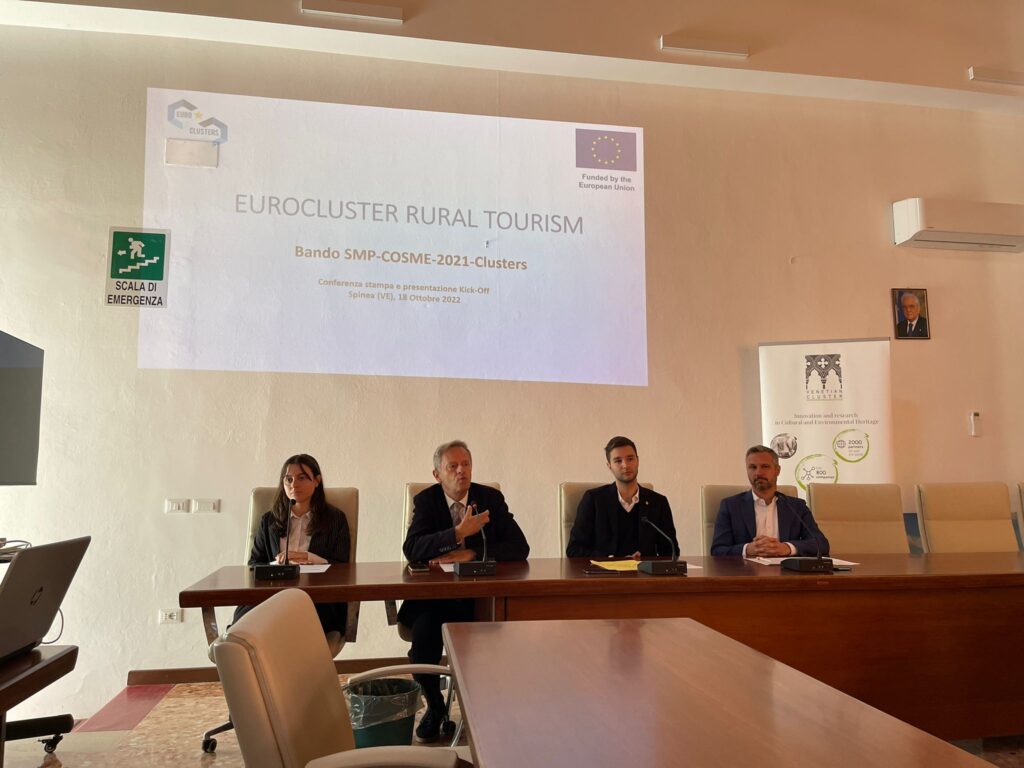Thanks to the new EU Rural Tourism project, funded by the European Union’s COSME program, 5,000 euros will arrive for many micro-enterprises. Emphasizing the importance of this sector is the President of Longarone Fiere Dolomiti, Gian Angelo Bellati: “Tourism is one of the very important activities to be carried out in mountain areas and the Fair is working in this direction. Tourism activities are not relocatable activities and they create stable jobs.”
Hosted by the City of Spinea, the EU Rural Tourism project was presented yesterday. Among its goals is also the creation of a Eurocluster of “rural tourism.” Project partners and lead partner is the VENETIAN CLUSTER together with the Romanian ASOCIATIA DE DEZVOLTARE INTERCOMUNITARA HARGHITA, the Czech NARODNI KLASTROVA ASOCIACE, the French RURALTOUR, the Spanish ASOCIACION CLUSTER DE TURISMO SOSTENIBLE DE ARAGON, the Greek EURACADEMY and associated partners LONGARONE FIERE DOLOMITI and EKOCLUB.
Representing the municipality was Councillor for the Environment Elia Bettin: “The Municipality of Spinea is particularly happy to participate in the realization of this project, which can bring significant benefits to Business Development in a sector that in the future will grow in compliance with the environmental parameters required by the new European standards; the Municipality of Spinea is therefore offering to host companies and start-ups in the sector.”
While the president of the Longarone Fair-and the Venetian Cluster- Gian Angelo Bellati, stresses that “for some years Longarone Fiere Dolomiti has been giving great importance to participation in European projects. One of them we recently won. We are a partner in the project called EU Rural in the tourism sector. Tourism, in fact is one of the very important activities to be carried on in mountain areas, and the fair is working in this direction. Tourism activities are not relocatable and create stable jobs. What is important is that people come, that tourists come and that they are attracted by products, by tourism-related services that are cutting-edge, innovative, different and also extend the tourist seasons. So we are participating in this project together with Venetian Cluster in Venice, together with very important partners from Romania, the National Cluster of Czechia, the National Cluster of Spain, France and other countries that are interested. To create what? A district, a network, an itinerary formed by so many companies that want to bet on this different and alternative tourism. An open-air tourism, a tourism that reduces overcrowding in the cities, that points to wider areas, open areas, areas that are precisely rural, mountain, hillside. Areas where you can enjoy on the one hand the environment, on the other hand the great culture that many of these territories can offer. And on another side also the food and wine aspect that means well-being, means being well. All this with the aim of then arriving at a call for tenders that in the spring will open the possibility for our businesses that also want to invest in this new way of doing tourism, the possibility of having help and advice, but also funding for each small business that will be able to have wire to €5,000 of funding. Right now the network and all the relationships between the partners are being organized, so that we can also exchange best practices, so-called best practices. A project that wants to create jobs, go against depopulation, especially of mountain areas, and allow a very interesting district of small and medium-sized enterprises in rural tourism to be born.”
A project characterized by significant numbers and well-structured, as Venetian Cluster project manager Maurizio Malè explained in his presentation. A total value of 1,299,644.47 euros, of which 1,263,235.52 euros were funded by the European Union. Italy, and more specifically Veneto, will get 172,973 Euro. Several actions will be undertaken, from the creation of a European Cluster of Sustainable Rural Tourism – Eurocluster Rural Tourism, to the realization of a variety of digital material for the network and toolkits to support SMEs, to direct assistance to businesses through a specific call for proposals. This will enable services to be offered to at least 190 small, micro and nano enterprises in 15 different countries. Approximately 5,000 euros per enterprise for a total of 950,000 euros earmarked exclusively to support these enterprises that are the foundation of rural and sustainable tourism in Europe.




